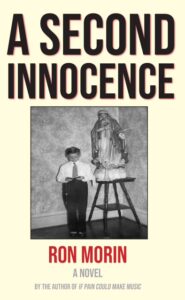 I wrote Book II of A Second Innocence first because Daphne, the main character, was, in my mind, the spiritual heir to Beatrice, Lemeilleur’s daughter in If Pain Could Make Music. I love Beatrice, but she was never developed! Yes, she’s the eminence grise of my first novel, and as such is very powerful, but in an unofficial capacity. Subconsciously, I couldn’t let her go, and her spirit came back as Daphne.
I wrote Book II of A Second Innocence first because Daphne, the main character, was, in my mind, the spiritual heir to Beatrice, Lemeilleur’s daughter in If Pain Could Make Music. I love Beatrice, but she was never developed! Yes, she’s the eminence grise of my first novel, and as such is very powerful, but in an unofficial capacity. Subconsciously, I couldn’t let her go, and her spirit came back as Daphne.
We are living in a moment when the worm of self-hatred is eating the soul of America. Daphne, who has every reason to self-hate, asserts her inalienable right to pursue personal growth. Daphne’s opposition to the worm—her transformation symbolizes triumph over adversity and is used in this literary work to represent resilience and empowerment as she struggles for personal freedom.
So often on ordinary TV, we see how the power of trauma has turned some poor soul into a murder-happy villain. Rarely do we see the opposite: How some trauma-battered person turns into a healthy, well-adjusted, loving person. I choose the name Daphne for its association with victory and honor.
Daphne sees the world as poet John Keats suggested, as a vale of Soul-making: That the world is a place where souls develop through experiences of suffering and hardship—that pain and troubles are necessary to transform our soul and shape our character.
How many times, as I dreamed about Daphne, did I see her sitting in prison reading the words
The weariness, the fever, and the fret
Here, where men sit and hear each other groan;
Where palsy shakes a few, sad, last gray hairs,
Where youth grows pale, and spectre-thin, and dies;
Where but to think is full of sorrow
And leaden-eyed despairs.
as she wonders where her power to transform will come from.
Where will Daphne find her faith?
Since, fundamentally, this book is about faith, A Second Innocence is awash in the spirit of Soren Kierkegaard. Will Daphne become a knight of infinite resignation? Does she have the capacity and willingness to give up what she holds dearest and be reconciled to that loss?
No part of Daphne’s story is not about love, and for the record, it is the spiritual opposite of King Queen Knave by Nabokov.
Some parts of me died when I finished Book II. It was a powerful exorcism—I
was trying to give birth to a sense of worth. Wordsworth was right: writing is a revelation of the self to the self.
For months I was in despair. Where would I go with Daphne’s story? The world seemed to me to be locked in the iron grip of the nihilism of one man. I, like Daphne, was gasping for air, as I groped for a meaning of life.
The dark spell broke during a ping pong game with friends who are genuine
believers. Their faith protects them from lies and alienation. I admire them. And because they are decent and loving, I, all of a sudden, started to imagine: What if they had adopted a child? (They are childless.) More or less, at that moment, a new character was born—Raphael, and Book I of A Second Innocence began.